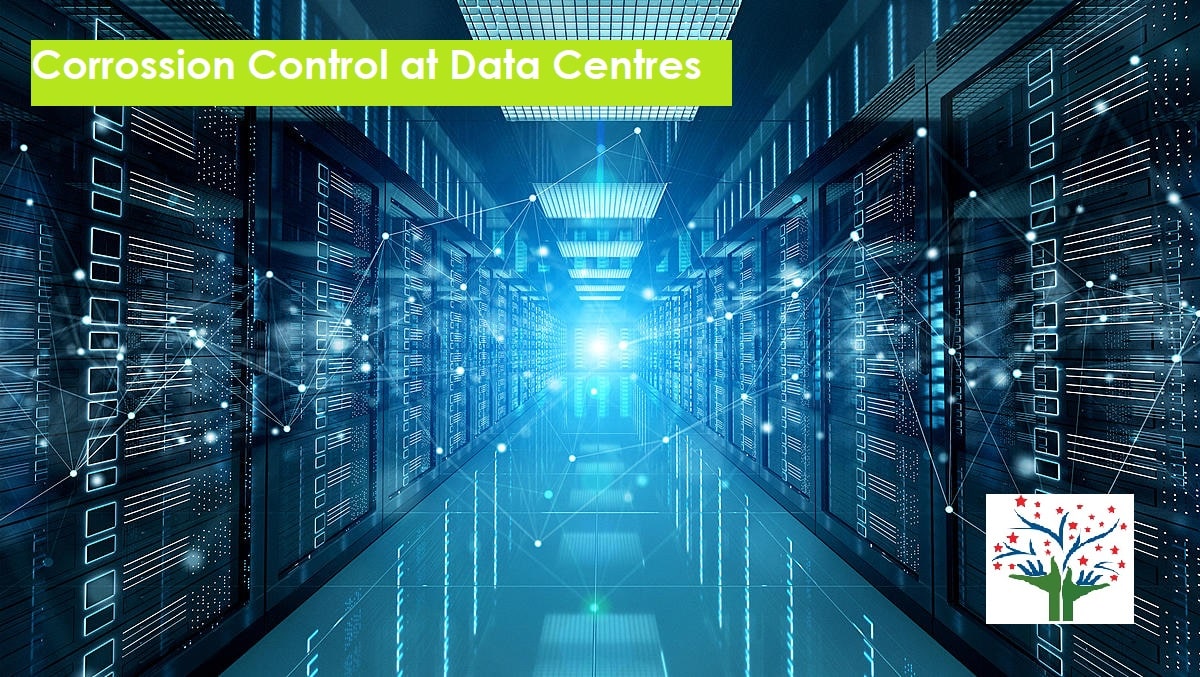Learn all Corrosion Control Prevention Methods
Corrosion Control or Monitoring at data centers is process of identification of contaminants or Pollutants present in the environment & measuring its effects to avoid major failures at data centers.
Data Centers are undoubtedly amongst the crucial elements of any organization that has gone digital. If data centers weren’t formed, people may have created online content such as music, apps, graphic or written, but there wouldn’t have been a source to save them. Many of us may not be aware, but data centers have been a part of the computing world since the beginning and they contribute to backup and recovery of data, as well as networking.
While these fundamental centers save our data from disappearing, it is our role to save them from corrosion. This is why we urge to educate organizations about Corrosion Control at Data Centers because even the slightest mishap may disrupt TBs of stored content.
According to the research presented by ASHRAE (American Society of Heating, Refrigerating and Air-Conditioning Engineers), the organisation spoke about Data Center Airborne Contamination. In the research, the American professional association mentioned that Data Centers are at major risk of hardware failures due to gaseous contamination.
Meaning, Data Centers need to understand the importance and significance of Indoor Air Quality Monitoring and how it helps to keep machines, computing equipment and others safe from failures and corrosion.
How building up corrosion at Data Centers is dangerous?
Data Centers mainly consist of metallic and non-metallic materials items that are highly prone to corrosion caused by Indoor Air Pollution. Some of the common component failures include hard disk drives (HDD), graphic cards, motherboards, DIMMs, capacitors, and transistors.
If these electronic components are affected, it can cause major damage to one’s entire data storage facility. Edge connectors are mostly at a higher risk in comparison to disk drives and film disks because they are made of copper and are situated on the circuit boards.
Learn More about Corrosion Testing Methods
Significance of Corrosion Control at Data Centers
Technology has made everything so quick and easy, that a short downtime may result in a massive outrage of users on social media. But, how can Corrosion Control help Data Centers to provide quick services?
Learn More about Salt Spray Test for Corrosion
Major Contaminants or Pollutants in Data Centre
The answer is simple, a badly managed data center will have bad Indoor Air Quality filled with gaseous contaminants such as Hydrogen Sulphide (H2S), Sulphur Dioxide (SO2), Bromine and Oxides of Nitrogen, Chlorine etc. These gases cause electronic failures, an increase in downtime, and much more.
And, in a world where everything moves so quickly, especially after the introduction of 5G, users and businesses demand instantaneous information. Big computing equipment manufacturers like IBM, Intel, HP, CISCO, Dell, etc, support this ideology.
It has been noted that many Data Centers are quite good at keeping temperature and humidity under control, but they lack at controlling and monitoring dust and gaseous contamination because it requires a skilful approach from Indoor Air Quality experts like us. We have noticed that Data Centers located in industrial townships are more prone to gaseous contaminants, corrosion and Indoor Air Pollution.
Microsoft’s underwater data centre experiment seems to be way more efficient than a conventional one.
Data centres on the land are prone to corrosion from oxygen and humidity. #corrosioncontrol #DataCenter pic.twitter.com/noDNuynt8S— Perfect Pollucon Services – Air Quality Monitoring (@PerfectPollucon) March 28, 2021
Corrosion Control is highly important for Data Centers located near –
- High temperature locations
- Landfill sites
- Process Industries
- Sewers/ Drains
- High density traffic
- Polluted environment
Learn more about Corrosion testing Laboratories
Advantages of Corrosion Monitoring at Data Centers
Corrosion monitoring at data centers offers several advantages that are crucial for the reliable and efficient operation of the facility. Some of these advantages include:
- Corrosion Control keeps the hardware safe from getting corroded
- Doing regular Corrosion Control helps in increasing the longevity of hardware equipment, machines, metals and more.
- Keeps employees safe
- Protects important data saved by users around the globe
- Prevents electronic malfunctions
- Decreases the chances of high downtime
- Reduces maintenance cost
- Increases productivity
- Enables a healthy and safer environment for employees
Overall, corrosion monitoring in data centers plays a vital role in ensuring the reliability, safety, and efficiency of critical IT infrastructure. By proactively detecting and addressing corrosion, organizations can avoid costly repairs, maintain optimal performance, and provide a secure environment for their data and operations.
Corrosion Testing Methods for Data Centre
- At first, experts advise sealing all penetration points such as doors, windows, and walls in the data center
- A smart Data Center owner makes sure to measure the reactivity rates or corrosion rate inside the data centre as well as in the outdoor air.
- Next comes installing room pressure monitors, only if the design of the center needs positive pressure.
- Next comes measuring airflow at the supply and exhaust air grills CRAC unit
- Last on the list is developing a temperature and humidity profile of your data center.
Corrosion Control Filtration Equipment
Corrosion control filtration equipment plays a pivotal role in safeguarding industrial systems and infrastructure from the damaging effects of corrosion. Corrosion is a persistent challenge that can lead to significant economic losses and safety hazards.
Filtration equipment, specifically designed for corrosion control, helps maintain the purity and integrity of fluids and gases used in various industrial processes. These filtration systems effectively remove harmful particles, contaminants, and impurities from fluids, preventing corrosive substances from compromising the integrity of pipelines, machinery, and storage tanks.
By mitigating corrosion, these filtration solutions extend the lifespan of equipment, reduce maintenance costs, and ensure the overall reliability and safety of critical industrial operations. Whether in the oil and gas, petrochemical, or water treatment industries, corrosion control filtration equipment plays a vital role in protecting assets and promoting sustainable, long-term operations.
Process of Corrosion Monitoring at Data Centres
According to various RoHS directives, data center owners, managers, and operators should incorporate IAQ and environmental contamination monitoring as a part of site planning, risk management, mitigation, and improvement plan. The improvement plan for Data Centre to control and eliminate contamination of Indoor Air Quality comprises of three parts –
At first, owners need to assess outdoor air and indoor air quality to understand the corrosion potential of the environment. To know about the types and levels of gaseous contamination, use ISA Standard 71.04 which will help you gain site-specific data and the amount of corrosion getting formed. You can hire professional air quality testing partners to do this for you like us.
You can also use CCCs (Corrosion classification coupons) as a survey tool to establish baseline data. It will help you to determine whether you need to take actions for corrosion control or not, and if yes, which ones.
Once you have determined that your Data Center has been contaminated, you need to come up with a specific corrosion control strategy. Experts believe that most of the time corrosion takes place in an indoor environment due to chemical contaminants or a combination of contaminants.
Read more about Environmental Monitoring at Data Centres
Air Quality at Data Centre
Data center air quality refers to the condition of the air within a data center facility. It is a critical factor that directly impacts the performance, reliability, and efficiency of the equipment housed within the data center. Maintaining high air quality is crucial to prevent dust, contaminants, and other airborne particles from affecting sensitive IT equipment.
Poor air quality can lead to increased equipment failure rates, reduced performance, and increased energy consumption. To ensure optimal air quality, data centers employ advanced ventilation systems, air filtration technologies, and temperature control mechanisms.
These measures help to remove particulate matter, control humidity levels, and maintain a consistent temperature, creating a clean and controlled environment for the smooth operation of servers, storage systems, and networking equipment. By prioritizing data center air quality, organizations can minimize the risk of downtime, prolong the lifespan of their equipment, and provide a reliable infrastructure for their digital operations.
Air Quality Standards at Data Centers
Data center air quality standards are a set of guidelines and regulations that define the acceptable parameters for maintaining a clean and controlled environment within data center facilities. These standards establish specific criteria for factors such as temperature, humidity, particulate matter, and other contaminants to ensure optimal performance, reliability, and safety.
Adhering to these standards is essential for data center operators to meet industry best practices and comply with regulatory requirements. Standards such as ASHRAE, ISO 14644-1, ANSI/TIA-942, Uptime Institute’s Operational Sustainability Standard, and BICSI 002-2019 provide comprehensive guidelines for designing, constructing, and operating data centers with a focus on air quality.
By following these standards, data centers can effectively manage and monitor air quality, mitigate risks of equipment failure, reduce downtime, and create a conducive environment for critical IT infrastructure.
Maintaining air quality in data centers is critical for hardware longevity and performance. Contaminants like dust, humidity, and gases can cause failures, corrosion, and overheating.
| Factor | Recommended Standard | Why It Matters |
|---|---|---|
| Temperature | 18°C – 27°C (ASHRAE TC 9.9) | Prevents overheating or freezing |
| Humidity | 20% – 80% RH, Dew Point: 5.5°C – 15°C | Avoids rust (high humidity) & static (low humidity) |
| Dust & Particles | ISO Class 8 (ISO 14644-1) | Too much dust clogs vents & causes overheating |
| Filters | MERV 8 – 13 (ASHRAE 52.2), HEPA for clean rooms | Removes dust, pollen, and airborne particles |
| Harmful Gases | ISA-71.04-2013: Copper corrosion ≤ 300 Å/month, Silver ≤ 200 Å/month | Prevents corrosion of equipment due to SO₂, H₂S, NOx |
| Ventilation | ASHRAE 62.1: Proper airflow with exhaust systems | Ensures fresh air circulation & removes contaminants |
| Monitoring | Air quality sensors (PM2.5, gases, humidity) | Helps detect and fix problems early |
Knowing what type of measures to take, helps you to select and apply appropriate chemical filtration systems for cleaning the outdoor air being used for pressurization and ventilation.
Read more about Data centre Air Quality Standards
Data Center Cleaning Standards
Regular cleaning in data centers is crucial to prevent dust buildup, static electricity, and contamination, which can damage IT equipment. ISO 14644-1 (Class 8) sets cleanliness standards, ensuring dust levels stay low. HEPA vacuums, anti-static wipes, and MERV 13+ filters help maintain air quality.
Key areas to clean include floors, server racks, ceilings, underfloor plenums, air vents, and equipment surfaces. Electrostatic discharge (ESD) protection, such as anti-static flooring and wrist straps, is essential to prevent hardware damage. Following OEM cleaning guidelines and avoiding harsh chemicals ensures equipment longevity.
Routine cleaning schedules—weekly for high-traffic areas, quarterly for ceilings/walls, and semi-annually for underfloor spaces—help maintain a contaminant-free environment. Using air quality sensors and monitoring humidity levels further enhances cleanliness.
A well-maintained data center improves efficiency, prevents downtime, and extends the lifespan of IT equipment. 🚀
| Cleaning Task | Recommended Standard | Why It Matters |
|---|---|---|
| Floor Cleaning | ISO 14644-1 (Class 8): Use anti-static vacuum & damp mop | Removes dust that can enter server racks & clog cooling systems |
| Server Racks | Use microfiber cloths & approved anti-static cleaners | Prevents static discharge & dust buildup on hardware |
| Ceiling & Walls | Clean quarterly with HEPA vacuum & non-abrasive cloth | Prevents falling dust particles from contaminating equipment |
| Underfloor Plenum | Clean semi-annually using HEPA vacuum | Prevents airflow contamination in raised floor environments |
| Air Filters & Vents | Replace or clean monthly (MERV 13+ filters recommended) | Maintains proper airflow & reduces airborne contaminants |
| Equipment Cleaning | Follow OEM guidelines; use lint-free wipes & isopropyl alcohol (70%) | Prevents component damage & ensures longevity |
| Electrostatic Discharge (ESD) Control | Use ESD-safe vacuum, wrist straps & anti-static flooring | Prevents static shocks that can damage sensitive electronics |
| Pest Control | No food/drinks; monitor with non-toxic traps | Prevents rodents/insects from damaging cables & equipment |
Proper cleaning in data centers is critical for preventing dust buildup, static electricity, and contamination, which can damage IT equipment.
✅ Reviewed by Our Expert Leadership Team
This service offering is created and reviewed by our senior team of environmental professionals with 10–40 years of experience in pollution control, regulatory compliance, and monitoring services.

Tanaji S. Gajare
Founder & Chairman
40+ years in air & water monitoring, sustainability leadership

Anil Shelke
Executive Director
30+ years in compliance, audits, and ETP/STP operations

Kunal Gajare
Environmental Engineer
10+ years in stack monitoring, MPCB/MoEF clearances, EIA
Frequently Asked Questions:
Data centre contamination can be very harmful and can cause reduced energy efficiency to major equipment failure.
As per recent news, Data centres are polluting the environment and are using electricity at the most throughout the year. Resulting in 0.3% of global CO2 emissions but some of the companies have started using renewable energy for their data centres.
As per news sources, Data centres are releasing pollutants into the environment and are using the energy throughout the year. It is resulting in 0.3% of total global CO2 emissions.
The maintenance of Data centres plays a very important role in the profitability of the infrastructure. TO Maintain a data centre one can do a regular visual inspection, cleaning, testing, reporting, monitoring, repairing, perform safety checks to increase the life of the data centre.
Corrosion can be checked through various methods, including:
Visual Inspection: Regular visual assessments of metal surfaces and structures to identify signs of corrosion, such as rust, pitting, or discoloration.
Non-Destructive Testing (NDT): Using techniques like ultrasonic testing, radiography, or eddy current testing to evaluate the integrity of metal without causing damage.
Corrosion Monitoring: Installing corrosion monitoring systems that continuously measure corrosion rates and alert when corrosion exceeds acceptable levels.
Chemical Analysis: Conducting chemical analysis of fluids and gases in contact with metal to identify corrosive agents and take appropriate preventive actions.
Protective Coatings: Applying corrosion-resistant coatings or paints to metal surfaces to act as a barrier against corrosive elements.
Cathodic Protection: Implementing cathodic protection systems to divert corrosion from the metal structure by using sacrificial anodes or impressed current.
By employing these methods, industries can effectively control corrosion, prolong the life of their assets, and ensure the safety and reliability of their operations.
The most important tool to use in corrosion prevention and inspection is the “corrosion sensor.” Corrosion sensors play a crucial role in monitoring the rate of corrosion on metal surfaces in real-time, providing invaluable data on the health of infrastructure and equipment.
These sensors utilize various techniques such as electrochemical measurements, galvanic principles, electrical resistance, or ultrasonic waves to assess the extent and progression of corrosion.
By facilitating early detection and intervention, corrosion sensors enable proactive maintenance, helping to prolong the lifespan of assets, reduce downtime, and prevent costly damage caused by corrosion-related failures.
Air quality is tested using particulate counters (for dust), gas analyzers (for SO₂, H₂S, NOx), and humidity/temperature sensors. Regular ISO 14644-1 compliance checks ensure cleanliness standards are met.
Data centers follow ASHRAE TC 9.9 and ISO 14644-1 (Class 8) standards, which regulate temperature, humidity, and airborne contaminants. They recommend MERV 8-13 filtration, copper/silver corrosion limits (ISA-71.04-2013), and controlled airflow for optimal performance.
Air quality tests involve measuring PM2.5 & PM10 levels, gas concentrations, and humidity using calibrated sensors. Additionally, copper/silver coupons are used to monitor corrosion impact over time.
Data centers generate pollution indirectly via high energy consumption, leading to CO₂ emissions from power plants. Indoor pollution risks include dust accumulation, volatile organic compounds (VOCs), and exhaust leaks.
Data centers use real-time sensors to monitor temperature, humidity, particulate matter, and gases. Collected data is analyzed to ensure compliance with ASHRAE & ISO standards.
While data centers do not emit toxic pollutants, they consume significant electricity and can generate noise and heat. Proximity to backup generators (diesel-based) may pose air quality concerns.
Globally, data centers contribute 2-3% of total CO₂ emissions, primarily due to power consumption and cooling systems. Shifting to renewable energy can significantly reduce their carbon footprint.
The biggest challenges are heat management, power consumption, and air contamination. Without proper ventilation and filtration, overheating and hardware failures can occur.
The ideal data center location has stable power supply, low humidity, minimal pollution, and low risk of natural disasters. Popular locations include cooler climates with renewable energy access.
A good location has low seismic activity, access to fiber-optic networks, and efficient cooling options. Many data centers are built in Nordic countries, remote U.S. areas, or near renewable power sources.
Data centers use CRAH (Computer Room Air Handler) and CRAC (Computer Room Air Conditioner) units. These systems regulate temperature and airflow for efficient cooling.
ASHRAE TC 9.9 provides environmental guidelines for temperature, humidity, and air quality to prevent IT failures. It defines recommended ranges for cooling and contamination control.
CFM (Cubic Feet per Minute) measures airflow volume within data center cooling systems. Higher CFM ensures better heat dissipation and prevents hotspots.
CRAH units use chilled water from an external system, while AHUs use refrigerants for cooling. CRAH is more energy-efficient, especially in large data centers.
CRAC (Computer Room Air Conditioner) is a cooling system that maintains temperature and humidity levels in data centers. It operates similarly to traditional air conditioners but is optimized for IT loads.
Contact us if you want to get Corrosion Monitoring done for your data center. We are happy to help you.

